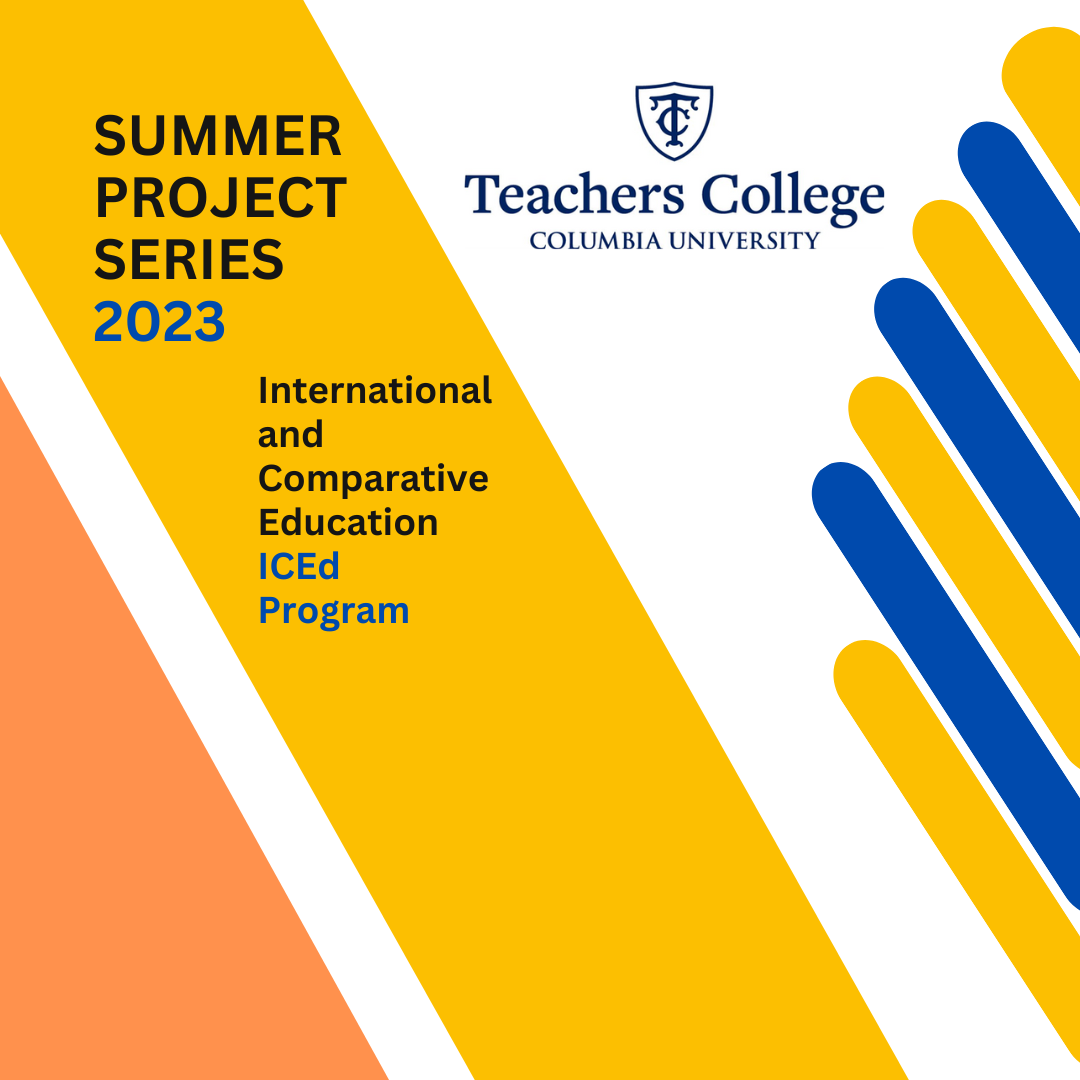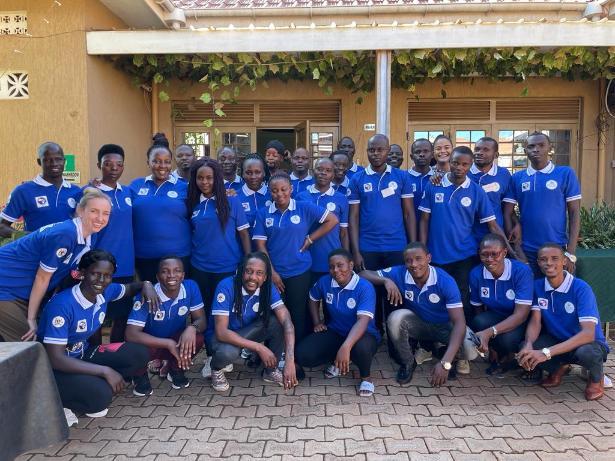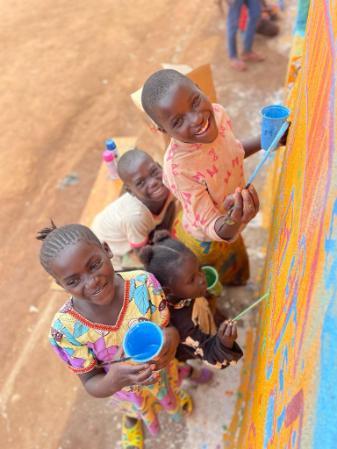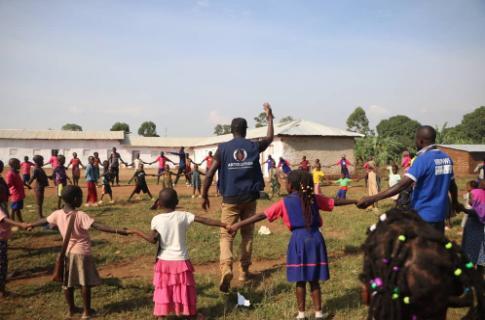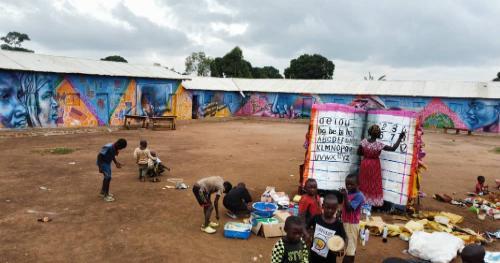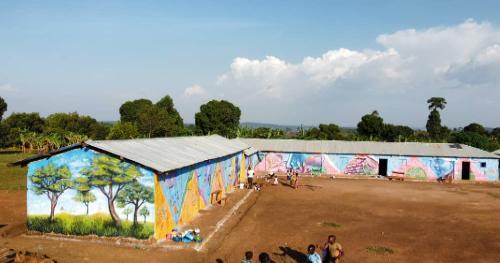This summer Faculty and students of the International and Comparative Education (ICEd) Program organized and participated in multiple research projects across a wide range of educational topics. Over the next weeks, we will be releasing stories about these projects.
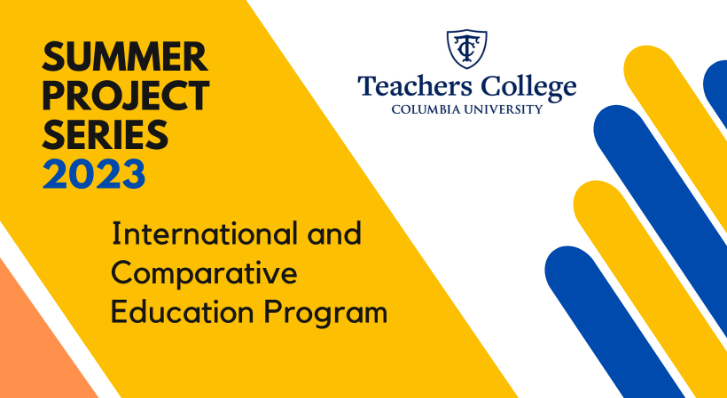
The Ubumwe: Exploring Arts for Education and Psychosocial Support with Refugee Children and Youth Project, funded by Columbia World Projects, set out to explore how the arts can be integrated in both formal education and broader community spaces to bolster psychosocial well-being, academic achievement, social cohesion, and peace among the refugee and host communities in the Kyangwali settlement in western Uganda. The Ubumwe project, which means “unity” in Kinyabwisha, was initiated at the request of a school leader running a community-based school in Kyangwali who believed that art education has the power to change the students’ experiences by promoting creative expression, collaboration, and reflection. The concept of Ubumwe also reflects this initiative’s multi-partner, interdisciplinary, and collaborative effort, which includes Teachers College (represented by Dr. Mary Mendenhall and doctoral student Kemigisha Richardson), Columbia’s Mailman School of Public Health, Building African Communities Opportunities (BACO) Foundation, Hopelink Action Foundation (HAF) Uganda, AfriChild Center at Makerere University, and two New York City-based arts organizations, Artolution and Arts Ignite.
To initiate this project, students in Dr. Mendenhall’s spring 2023 Education in Emergencies class designed and drafted a 12-week primary education arts curriculum.
These amazing students included: Arwa Ayoub, Andreia Davies, Sarah Etzel, Sabrina Huang, Sujung Hwang, Victoria Jones, Claire Laslett, Kathryn Lin, Theo Ntwari, Kemigisha Richardson, Aishwarya Sadh, Rafa Sattar, and Ashley Smith. This group co-developed the curriculum with project partners, as well as teachers at a local school in Kyangwali to design a culturally relevant and dynamic curriculum that is contextualized to align with the needs, values, and hopes of the school community.
The curriculum is specifically designed for Primary 3, 4, 5, and 6 students, with the lessons in Primary 3 and 4 focusing on the performing arts and lessons in Primary 5 and 6 focusing on visual arts. Additionally, a team of three Teachers College students, Renna Bazlen, Evan Zhang, and JooHyun Lee, developed a full monitoring and evaluation plan for the Ubumwe project during Dr. Wendy Choo’s Spring 2023 Monitoring and Evaluation course.
In May 2023, the Ubume project team led a one-week teacher professional development (TPD) workshop in Hoima, Uganda, with 13 teachers and 3 school leaders from the local school. The team was also joined by representatives from an international non-governmental organization (INGO) that oversees education in the settlement, UNHCR (the UN refugee agency), and the Ugandan Government, all of whom are based in the Kyangwali refugee settlement. The workshop was led by teaching artists from Arts Ignite and Artolution. Workshop sessions included: utilizing arts as a teaching method in other core subjects; teaching theater, storytelling, music, dance, painting, drawing, and sculpture-making; reviewing P3-P6 curricula; measuring program outcomes and the feasibility of implementing the curricula in their setting through surveys and reflections; and practicing the lesson plans with students at the school with teaching artists demonstrating.
About this photo. Project team members, teachers, and school leaders that participated in the 7-day teacher professional development workshop in Uganda
Teachers and other workshop participants developed short stories, performed skits, and performed step routines during the workshop. Teachers and workshop participants also engaged in collaborative brainstorming sessions to develop a mural and “foundstrument”, a sculpture from recycled materials that was inspired by Artolution’s “foundstrument, soundstrument”. On the last day of the workshop, teachers utilized their learnings from the workshop to lead students through community-building activities at the school and present the mural and sculpture they created while at the workshop. Students were also given the opportunity to add their own illustrations to the mural and paint the sculpture.
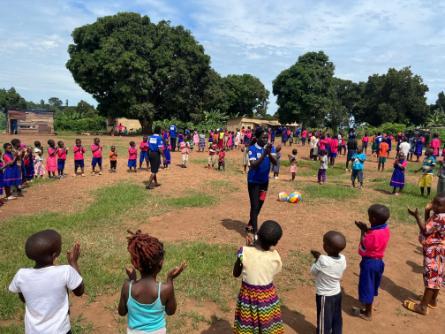
About this photo. Teachers leading students through a community building activity on the last day of the TPD workshop
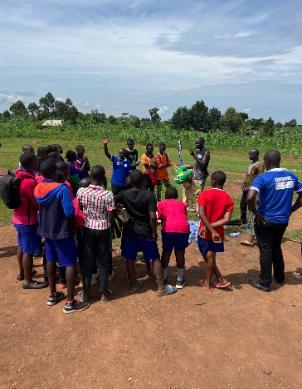
About this photo. Teachers and Artolution teaching artist, Esero Nalyong, introducing the sculpture that they made during the TPD workshop to students - a cow! Students were then given the opportunity to paint the sculpture
After the TPD workshop, teachers piloted the curriculum with students during the regular semester (May - August 2023) and shared their experiences, learnings, and reflections with the Ubumwe team through the M&E tools that were developed by TC students. Throughout Unit 1 and Unit 2 of the curriculum, teachers facilitated lessons that guided students through creative and collaborative performing and visual art lessons. In Unit 3, students were given the opportunity to brainstorm how they would like to showcase their learning and experiences with their community. In tandem, Artolution teaching artists facilitated community-based art activities in which students, teachers, and community members (including out-of-school youth) came together at the end of the term to paint a mural and build a “book of hope” out of recycled materials.
About this photo. Primary school students adding their own illustrations to the school mural with support and encouragement from local Artolution teaching artists
About this photo. Artolution teaching artist, Esero Nalyong,
leading students through a community building activity
About this photo. Students and teachers create a “Book of Hope” sculpture out of recyclable materials
About this photo. An aerial view of the school mural that was painted by teachers and students at the conclusion of the pilot curriculum
Project partners are currently reflecting on the pilot experience, including analyzing the M&E data and engaging teachers to share their experiences. They will continue to explore the possibilities for this approach, including how best to measure the outcomes and impact on both learning and psychosocial well-being through the integration of the arts in refugee settings.
Contact Details
If you would like to learn more about this project, please contact Dr. Mary Mendenhall (mendenhall@tc.columbia.edu) or doctoral student Kemigisha Richardson (kmr2219@tc.columbia.edu). For information about the ICEd Program, please visit our website, email us at iceinfo@tc.columbia.edu, or follow us on social media:
- Twitter: TC_ICeducation
- Facebook: International & Comparative Education at TC, CU
- Instagram: @tc_ic_education
— International and Comparative Education
